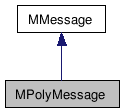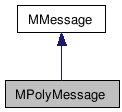MPolyMessage Class Reference
[OpenMaya - API
module for common classes]
#include
<MPolyMessage.h>


Detailed Description
Polygon component id change messages.This class is used to register callbacks for poly component id modification messages.
There is 1 add callback method which will add callbacks for the following messages:
- vertex component id modified
- edge component id modified
- face component id modified
Public Types |
|
| enum | { kVertexIndex = 0, kEdgeIndex = 1, kFaceIndex = 2, kLastErrorIndex = 3 } |
Static Public Member Functions |
|
| static MCallbackId | addPolyComponentIdChangedCallback (MObject &node, bool wantIdModifications[], unsigned int count, MMessage::MComponentFunction func, void *clientData=NULL, MStatus *ReturnStatus=NULL) |
| static MCallbackId | addPolyTopologyChangedCallback (MObject &node, MMessage::MNodeFunction func, void *clientData=NULL, MStatus *ReturnStatus=NULL) |
| static unsigned int | deletedId (void) |
Member Enumeration Documentation
| anonymous enum |
Member Function Documentation
| MCallbackId MPolyMessage::addPolyComponentIdChangedCallback | ( | MObject & | node, | |
| bool | wantIdModifications[], | |||
| unsigned int | count, | |||
| MMessage::MComponentFunction | func, | |||
| void * | clientData = NULL, |
|||
| MStatus * | ReturnStatus =
NULL |
|||
| ) | [static] |
This method registers a callback that should be called whenever a poly component id is modified.
Currently, there are some cases where the component ids for a polygonal mesh can be modified without generating a callback or without generating a correct mapping. These cases are outlined below.
- Polygonal mesh has construction history enabled, and there is more than one topology changing operation in the history. In this case, the callback is only called when the component ID mapping changes for the most recent operation, and performs the mapping with respect to the input and output meshes for this operation node.
- Polygonal mesh has construction history enabled, and the most recent topology changing operation is no longer the most recent operation. In this case, no id remapping callbacks will be invoked when the attributes on the operation node are changed in the history.
- When undo is used to revert a topology changing operation, the callback will not be invoked. The MEventMessage class can be used to get notification when undo is performed.
- Parameters:
-
[in] node the node callback function should listen to [in] wantIdModifications array of booleans specifying what arrays should be provided to the callback function when it is invoked. The entries in this array are kVertexIndex, kEdgeIndex, kFaceIndex for receiving vertex, edge, and face data in the callback respectively. [in] count the size of the array wantIdModifications [in] func the callback function
- componentIds an array of component id mappings
- count the size of the array componentIds
- clientData User defined data passed to the callback function
- Parameters:
-
[in] clientData User defined data passed to the callback function [out] ReturnStatus status code
- Returns:
- Identifier used for removing the callback.
- Status Codes:
-
- MS::kSuccess Operation succeeded
- MS::kInsufficientMemory No memory available
- MS::kFailure Error adding callback, at least one of the want*IdModifications parameters must be true
| MCallbackId MPolyMessage::addPolyTopologyChangedCallback | ( | MObject & | node, | |
| MMessage::MNodeFunction | func, | |||
| void * | clientData = NULL, |
|||
| MStatus * | ReturnStatus =
NULL |
|||
| ) | [static] |
This method registers a callback that will be called when a node impacting the topology of a meshShape is modified. Because the callback is invoked before the mesh has evaluated, the new topology data cannot be queried at the time the callback is received. If you want to receive a callback at a time when the new mesh data can be queried, use the following technique:
- Use this method to register a topology-changed callback.
- In the topology-changed callback, add an MNodeMessage::addAttributeChangedCallback on the mesh shape.
- In the attribute-changed callback, check the inputs for an MNodeMessage::kAttributeEval message received by the "outMesh" plug of the mesh.
- Once you have received the eval message on that plug, the attribute-changed callback can be removed and the mesh topology can be queried.
- Parameters:
-
[in] node the node the callback function should listen to [in] func the callback function
- node the node whose topolgy has changed
- Parameters:
-
[in] clientData User defined data passed to the callback function [out] ReturnStatus status code
- Returns:
- Identifier used for removing the callback.
- Status Codes:
-
- MS::kSuccess Operation succeeded
- MS::kInsufficientMemory No memory available
- MS::kFailure Error adding callback, at least one of the want*IdModifications parameters must be true
| unsigned int MPolyMessage::deletedId | ( | void | ) | [static] |
This method returns a constant which is to be used to determine if a component id has been deleted. Compare component ids returned by the callback with the value return by this method. If they are the same then, the component id has been deleted.
- Returns:
- Value of a deleted component id.